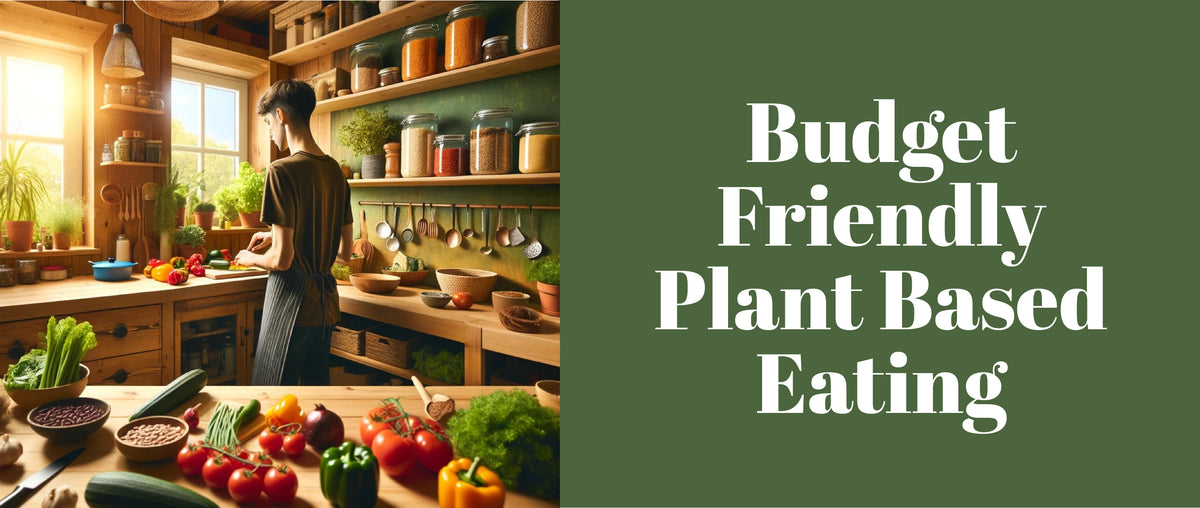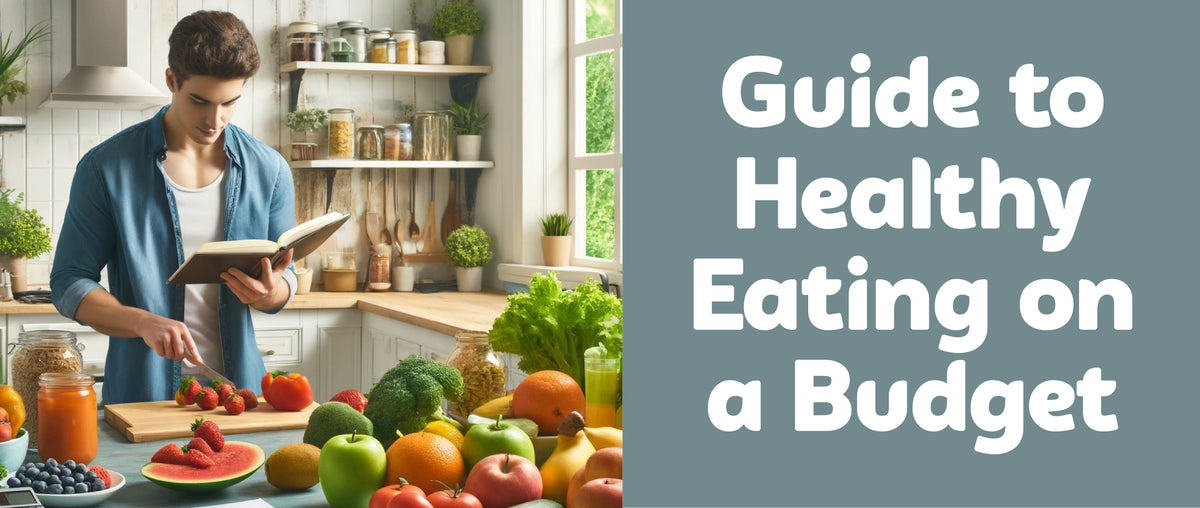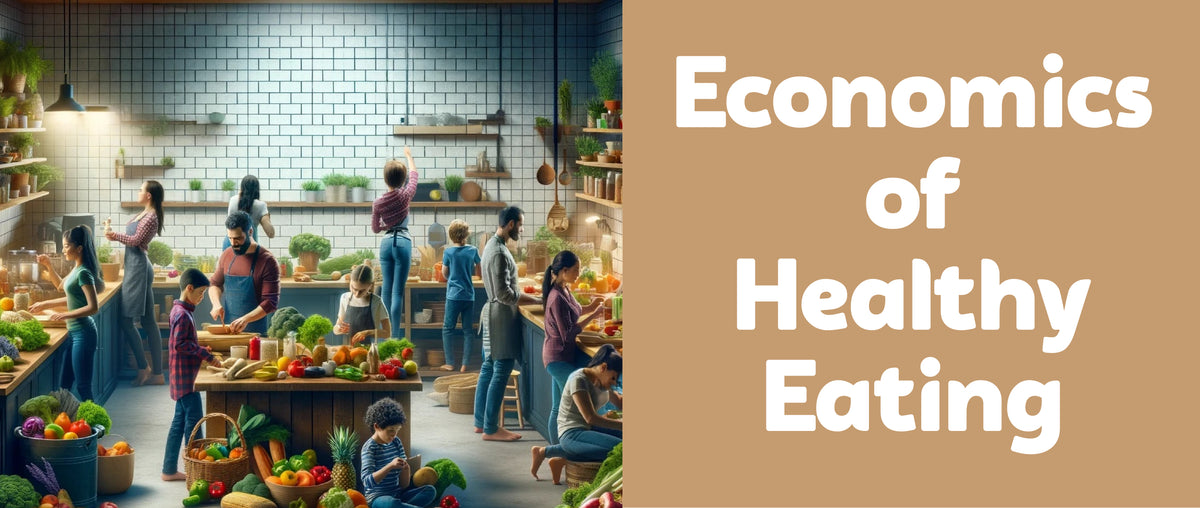Budget Friendly Plant Based Eating
Switching to a Plant Based diet doesn't have to break the bank. With some careful planning and smart shopping, you can enjoy delicious, nutritious meals while staying within your budget. This comprehensive guide will help you navigate the world of budget-friendly Plant Based eating, offering tips, recipes, and strategies to make Plant Based living accessible and affordable for everyone.
The Many Benefits of Plant Based Diets
Health Benefits
Plant Based diets offer numerous health benefits. They are often rich in fiber and low in calories, making them great for weight management and promoting overall health. For those looking for the best foods for weight loss, Plant Based diets are an excellent choice. Consuming more fruits, vegetables, and whole grains can lower the risk of heart disease and improve digestive health. Additionally, Plant Based proteins aid in Muscle Recovery without the saturated fats found in animal products.
Environmental Benefits
From an environmental perspective, Plant Based diets generally have a lower impact than diets heavy in animal products. They contribute to a reduced carbon footprint and promote sustainable food production, as Plant Based foods require fewer resources like water and land.
Cost Savings
One of the most appealing aspects of a Plant Based diet is the potential for cost savings. Plant Based staples like beans, lentils, and grains are typically less expensive than meat and dairy products. Additionally, better overall health can lead to fewer medical expenses in the long run.

What Is a Plant Based Diet?
A Plant Based diet focuses on foods primarily from plants, including fruits, vegetables, nuts, seeds, oils, whole grains, legumes, and beans. It's important to note that Plant Based doesn't necessarily mean vegetarian or vegan. While those following vegetarian and vegan diets consume Plant Based foods, a Plant Based diet can also include small amounts of animal products.
Difference Between Plant Based and Vegan Diets
A vegan diet excludes all animal products, including meat, dairy, eggs, and honey. In contrast, a Plant Based diet emphasizes whole plant foods but can include limited animal products. Common misconceptions about Plant Based diets include the belief that it's hard to get enough protein or that they are expensive. However, there are plenty of high protein snacks and affordable plant based foods available.
Tips for Eating Plant Based on a Budget
- Planning Meals Ahead: Planning your meals for the week can help you avoid last-minute, costly decisions. Batch cooking, where you prepare large quantities of meals that can be frozen and reheated later, is another effective strategy.
- Buying in Bulk: Buying dry goods like beans, lentils, grains, and nuts in bulk can save you a significant amount of money. Look for discount stores that offer bulk buying options.
- Utilizing Frozen and Canned Vegetables: Frozen vegetables are often cheaper and have a longer shelf life than fresh produce. Canned goods like tomatoes, beans, and corn can also be convenient and affordable.
- Growing Your Own Produce: Growing your own vegetables can be rewarding and save money. A small herb garden can add flavor to meals without the cost of store-bought herbs.
- Reducing Food Waste: Using leftovers creatively and storing food properly can help reduce food waste, saving you money in the long run.
Cheap Foods Included in a Plant Based Diet
List of Affordable Plant Based Staples
- Beans and lentils: Rich in protein and fiber, versatile and cheap.
- Whole grains: Brown rice, quinoa, oats, and barley are nutritious and budget-friendly.
- Vegetables: Carrots, potatoes, onions, and leafy greens are often inexpensive.
- Fruits: Bananas, apples, and oranges are typically affordable and nutritious.
Each of these staples offers significant nutritional benefits. For example, beans and lentils are high in protein and fiber and low in fat, while whole grains provide essential vitamins and minerals.
Affordable Plant Based Protein
Protein is an essential part of any diet, including a plant based diet. Affordable Plant Based Protein sources include beans, lentils, tofu, tempeh, chickpeas, and quinoa. These protein sources offer significant nutritional benefits and are typically much cheaper per serving than animal-based proteins.
Nutritional Benefits and Versatility
- Beans and lentils: High in fiber, protein, and various vitamins.
- Tofu and tempeh: Low in fat, high in protein, and versatile in cooking.
- Chickpeas: Rich in protein, fiber, and iron.
- Quinoa: Contains all nine essential amino acids.
How to Start a Budget-Friendly Plant Based Diet
Starting a budget-friendly Plant Based diet can be easy with some initial planning. Begin by assessing your current diet and identifying which animal products you consume. Find Plant Based alternatives for these products, create a weekly meal plan, and shop smart by buying in bulk, looking for discounts, and choosing seasonal produce. Preparing your own meals is often cheaper than eating out, and staying informed about new recipes, cooking techniques, and nutrition tips can help you maintain a balanced diet.
Tips for Beginners
Start slowly by incorporating more Plant Based meals into your diet. Find support by joining online communities or local groups focused on Plant Based eating, and experiment with new recipes and ingredients to keep meals interesting.
Common Challenges and Solutions
Common challenges include time constraints, which can be addressed by batch cooking and meal prepping, and nutritional concerns, which can be mitigated by including a variety of Plant Based foods in your diet.
Sample Meal Plans and Recipes
Having a plan makes it easier to stick to a budget-friendly Plant Based diet. Here’s a sample one-week meal plan:
- Monday: Burrito bowl for lunch, spaghetti for dinner.
- Tuesday: Tofu and vegetable stir-fry for lunch, chickpea salad for dinner.
- Wednesday: Quinoa and black bean salad for lunch, vegetable soup for dinner.
- Thursday: Lentil curry for lunch, stir-fried vegetables with rice for dinner.
- Friday: Hummus and veggie wrap for lunch, vegetable pasta for dinner.
- Saturday: Vegan chili for lunch, roasted vegetable quinoa bowl for dinner.
- Sunday: Leftover day - use up any remaining ingredients.
Specific Recipes
Burrito Bowl
- Ingredients: Brown rice, black beans, corn, salsa, avocado, lettuce.
- Preparation: Cook the rice, mix in the beans and corn, top with salsa, avocado, and lettuce.
Tofu and Vegetable Stir-Fry
- Ingredients: Tofu, bell peppers, broccoli, soy sauce, garlic, ginger, olive oil.
- Preparation: Sauté tofu in oil, add vegetables and stir-fry with soy sauce, garlic, and ginger.
Spaghetti
- Ingredients: Whole wheat spaghetti, tomato sauce, garlic, olive oil, basil.
- Preparation: Cook spaghetti, heat sauce with garlic and olive oil, mix and top with basil.
Grocery Shopping Tips
Smart shopping is key to staying within your budget while eating a Plant Based diet. Create a shopping list that includes staples like beans, lentils, rice, oats, frozen vegetables, and canned tomatoes, as well as fresh produce like seasonal fruits and vegetables and herbs. For proteins, include tofu, tempeh, chickpeas, and quinoa. Look for deals and discounts by using coupons, buying items on sale and in bulk, and shopping at stores known for lower prices and bulk options.
Benefits of Seasonal and Local Produce
Eating seasonal and local produce can enhance your Plant Based diet while saving money. Seasonal produce is often cheaper due to lower transportation costs, and it is fresher and lasts longer. Local produce has higher nutrient content because it is fresher and retains more nutrients. Eating seasonally ensures a diverse and balanced diet.
Batch Cooking and Meal Prepping
Batch cooking and meal prepping are effective strategies for saving time and money. Batch cooking allows you to cook large quantities at once, reducing daily cooking time, and it is cost-effective because you can buy ingredients in bulk and reduce food waste.
Step-by-Step Meal Prepping Guide
- Plan meals: Choose recipes for the week.
- Shop smart: Buy all ingredients in one trip.
- Prep ingredients: Wash, chop, and store ingredients.
- Cook in batches: Prepare large quantities of meals.
- Store properly: Use containers to store meals in the fridge or freezer.
Budget-Friendly Batch Cooking Recipes
- Lentil soup: Lentils, carrots, celery, onions, garlic, vegetable broth.
- Vegetable stew: Potatoes, carrots, peas, tomatoes, vegetable broth.
- Chickpea curry: Chickpeas, coconut milk, curry powder, onions, tomatoes.
Conclusion
Adopting a budget-friendly Plant Based diet is achievable with the right strategies. From planning meals and shopping smart to utilizing affordable staples and batch cooking, you can enjoy nutritious and delicious Plant Based meals without breaking the bank. Start small, stay informed, and enjoy the journey towards a healthier and more sustainable lifestyle.










